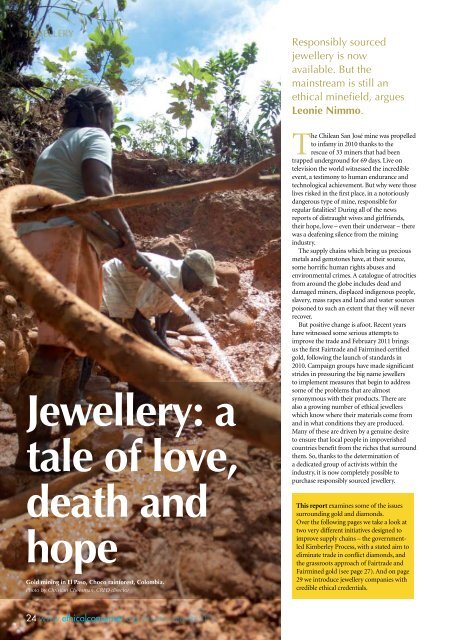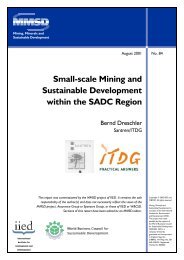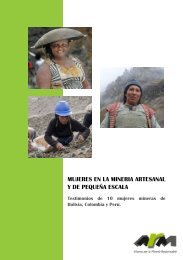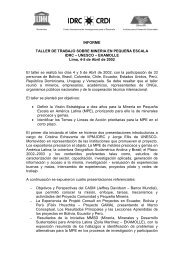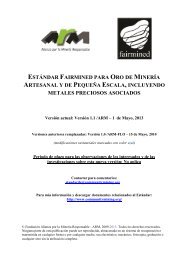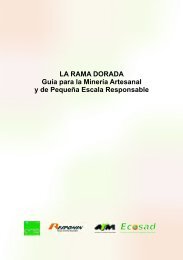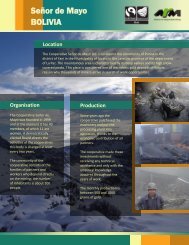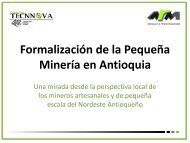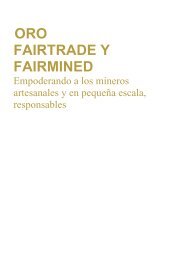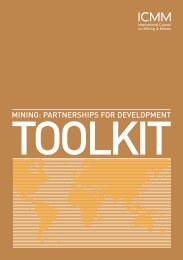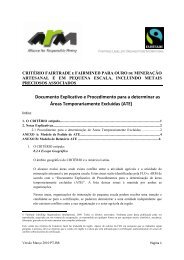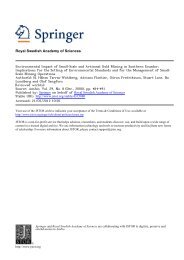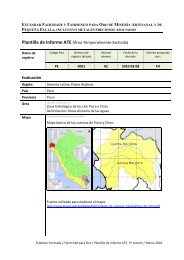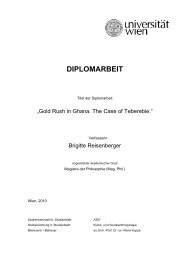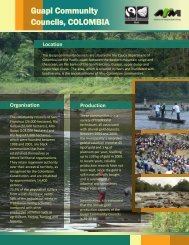A new gold standard - Alliance for Responsible Mining
A new gold standard - Alliance for Responsible Mining
A new gold standard - Alliance for Responsible Mining
You also want an ePaper? Increase the reach of your titles
YUMPU automatically turns print PDFs into web optimized ePapers that Google loves.
JEWELLERY<br />
Jewellery: a<br />
tale of love,<br />
death and<br />
hope<br />
Gold mining in El Paso, Choco rain<strong>for</strong>est, Colombia.<br />
Photo by Christian Cheesman, CRED director<br />
24 www.ethicalconsumer.org JANUARY/FEBRUARY ‘11<br />
Responsibly sourced<br />
jewellery is now<br />
available. But the<br />
mainstream is still an<br />
ethical minefield, argues<br />
Leonie Nimmo.<br />
The Chilean San José mine was propelled<br />
to infamy in 2010 thanks to the<br />
rescue of 33 miners that had been<br />
trapped underground <strong>for</strong> 69 days. Live on<br />
television the world witnessed the incredible<br />
event, a testimony to human endurance and<br />
technological achievement. But why were those<br />
lives risked in the first place, in a notoriously<br />
dangerous type of mine, responsible <strong>for</strong><br />
regular fatalities? During all of the <strong>new</strong>s<br />
reports of distraught wives and girlfriends,<br />
their hope, love – even their underwear – there<br />
was a deafening silence from the mining<br />
industry.<br />
The supply chains which bring us precious<br />
metals and gemstones have, at their source,<br />
some horrific human rights abuses and<br />
environmental crimes. A catalogue of atrocities<br />
from around the globe includes dead and<br />
damaged miners, displaced indigenous people,<br />
slavery, mass rapes and land and water sources<br />
poisoned to such an extent that they will never<br />
recover.<br />
But positive change is afoot. Recent years<br />
have witnessed some serious attempts to<br />
improve the trade and February 2011 brings<br />
us the first Fairtrade and Fairmined certified<br />
<strong>gold</strong>, following the launch of <strong>standard</strong>s in<br />
2010. Campaign groups have made significant<br />
strides in pressuring the big name jewellers<br />
to implement measures that begin to address<br />
some of the problems that are almost<br />
synonymous with their products. There are<br />
also a growing number of ethical jewellers<br />
which know where their materials come from<br />
and in what conditions they are produced.<br />
Many of these are driven by a genuine desire<br />
to ensure that local people in impoverished<br />
countries benefit from the riches that surround<br />
them. So, thanks to the determination of<br />
a dedicated group of activists within the<br />
industry, it is now completely possible to<br />
purchase responsibly sourced jewellery.<br />
This report examines some of the issues<br />
surrounding <strong>gold</strong> and diamonds.<br />
Over the following pages we take a look at<br />
two very different initiatives designed to<br />
improve supply chains – the governmentled<br />
Kimberley Process, with a stated aim to<br />
eliminate trade in conflict diamonds, and<br />
the grassroots approach of Fairtrade and<br />
Fairmined <strong>gold</strong> (see page 27). And on page<br />
29 we introduce jewellery companies with<br />
credible ethical credentials.
Diamonds<br />
The Kimberley Process (KP) is a voluntary<br />
diamond certification scheme that was<br />
established in 2003 following years of<br />
diamond-fuelled civil wars in West Africa.<br />
Its members are governments with the<br />
EU represented as a one member. Nongovernmental<br />
organisations and campaign<br />
groups have observer status alongside<br />
industry which is represented by the World<br />
Diamond Council. The Kimberley Process has<br />
no legislative power but member governments<br />
must implement national laws in line with<br />
Kimberley procedures. Most mainstream<br />
jewellers now offer KP certified diamonds<br />
promoted as ‘conflict free’.<br />
For the most part the<br />
conscience of consumers<br />
has been appeased.<br />
In the early years the<br />
scheme made recognisable<br />
progress but inherent<br />
problems have become<br />
impossible to ignore.<br />
A fundamental issue is<br />
that the KP only considers<br />
diamonds that fund civil<br />
wars and militia groups<br />
‘conflict diamonds’.<br />
There<strong>for</strong>e violence carried<br />
out by state <strong>for</strong>ces is essentially sanctioned.<br />
With a membership that includes countries<br />
such as the Democratic Republic of Congo,<br />
Angola, and Sierra Leone, it is easy to see<br />
why this has been a sticking point. The group<br />
makes its decisions by consensus, there<strong>for</strong>e<br />
any member state can effectively veto<br />
progress. According to Annie Dunnebacke<br />
of the campaign group Global Witness, this<br />
invariably results in “the lowest common<br />
denominator” prevailing. 1<br />
The KP certifies nation states rather<br />
than individual mines and currently the<br />
only country recognised as not meeting its<br />
<strong>standard</strong>s is the Côte d’Ivoire. This allows the<br />
organisation to claim that today less than 1%<br />
of diamonds are conflict diamonds; down<br />
from 15% be<strong>for</strong>e the scheme was launched. 2<br />
Kimberley in Crisis<br />
The Marange diamond fields in Zimbabwe<br />
have thrown the KP its biggest challenge<br />
to date. In the words of CRED Jewellery’s<br />
Business Director Christian Cheesman, the<br />
organisation is “in freefall”. 4 As this magazine<br />
was going to print it may well have just<br />
crashed and burned. On 16th November<br />
2010, the Zimbabwean KP monitor Abbey<br />
Chikane was reported to have approved<br />
Marange diamonds <strong>for</strong> export despite the<br />
fact that the organisation’s plenary meeting<br />
in Jerusalem ended on 4th November at a<br />
deadlock over the issue of the Marange fields.<br />
Sources claim they could be the biggest<br />
diamond reserves in the world, potentially<br />
“People woke up<br />
in the morning<br />
and the law had<br />
been changed. The<br />
punishment <strong>for</strong><br />
crossing the <strong>new</strong>ly<br />
drawn line was<br />
death”. 3<br />
providing 40% of rough diamond supply<br />
globally. 1<br />
Following the discovery of diamonds in the<br />
east of Zimbabwe in 2006, the government<br />
withdrew the rights held by a British company<br />
to mine the area and opened it up to anybody<br />
and their pickaxe. People flocked there from<br />
places as far afield as Belgium, Equatorial<br />
Guinea and Pakistan. 5 Five months later a<br />
police operation was launched, ostensibly<br />
to prevent illegal mining. Instead, against<br />
a background of human rights abuses, the<br />
police <strong>for</strong>ced miners to <strong>for</strong>m syndicates under<br />
their ‘protection’.<br />
The diamond rush reached its peak in<br />
November 2008 when it was brutally crushed<br />
by the Zimbabwean<br />
military one month after<br />
Mugabe’s ZANU-PF party<br />
agreed to share power<br />
with the Movement <strong>for</strong><br />
Democratic Change<br />
(MDC). Over three<br />
weeks, an estimated 214<br />
people were slaughtered<br />
by troops and helicopter<br />
gunships. 5 “People woke<br />
up in the morning and the<br />
law had been changed”,<br />
according to an editor<br />
of online Zimbabwean<br />
publication Zimeye, who did not wish to be<br />
named, “But they didn’t have access to that<br />
in<strong>for</strong>mation. The punishment <strong>for</strong> crossing the<br />
<strong>new</strong>ly drawn line was death.” 3<br />
The military has since <strong>for</strong>med their own<br />
syndicates, at times using <strong>for</strong>ced labour,<br />
including child labour, from the neighbouring<br />
villages and towns. Evictions, torture, rapes,<br />
beatings, executions and the refusal of medical<br />
care to people injured in the diamond fields<br />
have all been reported. 6<br />
According to Global Witness, the military<br />
today control 95%-97% of the Marange<br />
fields. 1 The rest are controlled by concessions<br />
which were granted to two South African<br />
companies in a way that allegedly violated the<br />
country’s own tendering laws. 7 The companies<br />
are reportedly headed up by senior <strong>for</strong>mer<br />
military officials and close allies of Mugabe<br />
who, along with the military, were rewarded<br />
<strong>for</strong> their loyalty to his ZANU-PF party.<br />
Following pressure from human rights<br />
organisations, exports from the Marange<br />
mines were temporarily frozen out from<br />
the Kimberley Process in November 2009.<br />
However, this in itself created a significant<br />
crack in the Process as it violates the the<br />
principle of state, rather than individual<br />
mine, accreditation and thereby drastically<br />
reduces the KP’s leverage. Whilst the Marange<br />
diamonds were (supposedly) held up, those<br />
from the other two diamond mines in<br />
Zimbabwe, one majority owned by mining<br />
giant Rio Tinto, continued to flow.<br />
A Joint Work Plan was agreed and the<br />
buyers’ guide<br />
Zimbabwean government was expected to<br />
implement a set a re<strong>for</strong>ms to demilitarise the<br />
Marange mines and prevent smuggling. The<br />
Kimberley Process appointed Abbey Chikane,<br />
a South African national, to devise the Plan<br />
and monitor the country’s progress. In May<br />
2010 he visited the country, a trip which<br />
apparently led to the arrest of a member of<br />
the civilian group that has official recognition<br />
by the Kimberley Process as a partner agency,<br />
the Centre <strong>for</strong> Research and Development<br />
(CRD). “It was a terrifying experience <strong>for</strong> the<br />
whole organisation”, said the Zimeye editor,<br />
“they were literally panicking, they were<br />
looking to get people out of the country”. 3<br />
Following Chikane’s report, which was<br />
heavily criticised by Human Rights Watch, the<br />
Kimberley Process approved two shipments to<br />
be exported from Marange at a meeting in St.<br />
Petersburg in July 2010.<br />
In September, the Daily Mail reported<br />
that in a government to government deal,<br />
rough diamonds from the mines were being<br />
exported to China under the supervision of<br />
the Chinese military in return <strong>for</strong> guns and<br />
ammunition. 8<br />
A deal was then struck with an Indian<br />
consortium of companies in October. It was<br />
agreed that the Marange fields would supply<br />
$1.2 billion of diamonds a year to <strong>new</strong>ly<br />
<strong>for</strong>med company Surat Rough Diamond<br />
Sourcing India Limited (SRDSIL). Little<br />
mention was made of what would happen<br />
should the KP rule against the Marange<br />
diamonds at its November meeting, and<br />
the issue remains unclear. A clue perhaps<br />
lies in the fact that the Indian consortium<br />
committed to providing the equipment and<br />
training <strong>for</strong> cutting and polishing to happen<br />
in-country. Another gaping loophole in the<br />
Kimberley Process is that it only refers to<br />
Zimbabwean Minister of Mines Obert Mpofu<br />
with handfuls of Marange diamonds at the Blue<br />
Star factory in Surat, India, October 2010<br />
image sourced from www.diamonds.net<br />
JANUARY/FEBRUARY ‘11 www.ethiscore.org 25
JEWELLERY<br />
rough diamonds. There<strong>for</strong>e those that are cut<br />
and polished in their country of origin can<br />
still legitimately be traded within the system,<br />
regardless of whether they would otherwise<br />
have been defined as conflict diamonds.<br />
Diamond dealers in the USA have since<br />
sent urgent messages to their Chinese and<br />
Indian counterparts requesting that the<br />
Marange diamonds be separated from other<br />
supply chains. President of jewellery retailer<br />
Borsheim’s pleaded: “I beg of Surat people<br />
to please segregate the Marange goods,<br />
be<strong>for</strong>e they supply us with the orders.” The<br />
SRDSIL has responded that this would be<br />
“impossible”. 9 There are clear signs within<br />
the industry that the Marange diamonds<br />
could destroy the legitimacy of the Kimberley<br />
Process, and potentially it won’t be long be<strong>for</strong>e<br />
consumer awareness catches up.<br />
Meanwhile Zimbabweans brace themselves<br />
<strong>for</strong> a <strong>new</strong> wave of violence in the run-up to<br />
elections, expected in June 2011. Reports<br />
of harassment by ZANU-PF militia are<br />
already beginning to leak out. The Minister<br />
of Defence has reportedly already said he<br />
will not allow the opposition to take over;<br />
likewise soldiers have stated they would<br />
not support the MDC. 3 Unchecked, the<br />
Marange diamonds could well help to prop<br />
up Mugabe’s regime and its corrupt elite <strong>for</strong><br />
many years to come.<br />
Laboratory grown<br />
diamonds<br />
Laboratory grown diamonds, also<br />
called synthetic or cultured diamonds,<br />
are now a commercial reality in the<br />
jewellery industry. Identical in chemical<br />
composition to natural diamonds, and<br />
substantially cheaper, they are an obvious<br />
way to avoid purchasing blood diamonds.<br />
However, question marks remain<br />
over the environmental impact of the<br />
manufacturing process and the working<br />
conditions in laboratories, many of which<br />
are reportedly in Asia. Retailer Vivien<br />
Johnston says she has been unable to<br />
access much in<strong>for</strong>mation about employee<br />
conditions and auditable <strong>standard</strong>s:<br />
“Nobody trying to sell me them has been<br />
able to tell me”. Johnston and Cheesman<br />
also concur that buying lab grown<br />
diamonds displaces the development<br />
potential of responsibly sourced natural<br />
diamonds.<br />
26 www.ethicalconsumer.org JANUARY/FEBRUARY ‘11<br />
International Jeweltree Foundation<br />
There are a growing number of jewellers who know their supply chains<br />
and only source from places that they are confident meet social and<br />
environmental <strong>standard</strong>s. Organisations such as the Jeweltree Foundation<br />
help to make this a reality by supplying retailers with gemstones and precious<br />
metals with guaranteed supply chain transparency. Their diamonds are sourced<br />
from places such as the Liqhobong Diamond Cooperative, a women’s mining co-operative in<br />
Lesotho.<br />
Silver<br />
Many ethical jewellery companies offer recycled silver products, and while some jewellers<br />
offer ‘fairly traded’ silver, there is no Fairtrade Foundation certification <strong>for</strong> silver.<br />
Israel and the Diamond<br />
Trade<br />
In a suburb of Tel Aviv, a <strong>for</strong>est of gleaming<br />
skyscrapers marks the Diamond District,<br />
home to perhaps the biggest diamond trading<br />
floor in the world. Diamonds accounted <strong>for</strong><br />
24% of Israeli export earnings in 2009, worth<br />
£7.3 bn. 10 According to Vivien Johnston of<br />
ethical jewellery retailer Fifi Bijoux, the Israeli<br />
diamond industry has historically had a<br />
reputation of being associated with the trade<br />
in blood or conflict diamonds: “They went in<br />
where other people feared to tread”. 11<br />
Today, however, Israeli diamonds have been<br />
the focus of protests <strong>for</strong> a different reason.<br />
In the lead up to the Jerusalem meeting a<br />
Facebook campaign, spearheaded by the Irish<br />
Palestine Solidarity Campaign (IPSC), sought<br />
to highlight the significance of diamonds <strong>for</strong><br />
Ramat Gan city, Tel Aviv, Israel<br />
– ‘The Diamond District’<br />
image © Slidezero | Dreamstime.com<br />
Israel’s exports and economy and the role that<br />
this has played in financing the occupation<br />
of Palestine. For those campaigning <strong>for</strong> the<br />
boycott of Israeli goods, focussing on the<br />
diamond industry could be significant.<br />
The possibility that Israeli diamonds may<br />
have been processed in illegal settlements<br />
presents another boycott angle. Who Profits?,<br />
the organisation that monitors settlement<br />
industrial production, has no record of such<br />
activity, and have pointed out that much<br />
Israeli diamond processing is now outsourced<br />
to India. 12 However, Salwa Alenat, of Israeli<br />
workers’ rights organisation Kav LaOved,<br />
told Ethical Consumer that she had met<br />
with a Palestinian who worked in a diamond<br />
workshop located in the industrial settlement<br />
of Atatrot in August 2010. 13<br />
Links<br />
•<br />
•<br />
•<br />
•<br />
•<br />
•<br />
•<br />
•<br />
•<br />
•<br />
•<br />
<strong>Alliance</strong> <strong>for</strong> <strong>Responsible</strong> <strong>Mining</strong> (ARM)<br />
www.communitymining.org<br />
Communities and Small-Scale <strong>Mining</strong><br />
(CASM) www.artisanalmining.org<br />
Fair Jewellery Action<br />
http://blog.gregvalerio.com<br />
Fairtrade Foundation<br />
www.fairtrade.org.uk<br />
Fairtrade Labelling Organizations<br />
International (FLO) www.fairtrade.net<br />
Jeweltree Foundation<br />
www.jeweltreefoundation.org<br />
Kimberley Process<br />
www.kimberleyprocess.com<br />
Initiative <strong>for</strong> <strong>Responsible</strong> <strong>Mining</strong><br />
Assurance www.responsiblemining.net<br />
Madison Dialogue<br />
www.madisondialogue.org<br />
No Dirty Gold Campaign<br />
www.nodirty<strong>gold</strong>.org<br />
<strong>Responsible</strong> Jewellery Council<br />
www.responsiblejewellery.com<br />
References: 1 Telephone interview with Annie Dunnebacke of Global Witness, 10/11/2010 2 http://www.kimberleyprocess.com/background/index_en.html [accessed 25/11/10] 3 Telephone<br />
interview with editor of Zimeye, 10/11/2010 4 Telephone interview with Christian Cheesman, CRED Business Director, 17/11/2010 5 Diamonds in the Rough: Human Rights Abuses in the Marange<br />
Diamond Fields of Zimbabwe, Human Rights Watch, June 2009 6 “Diamonds in the Rough” Human Rights Watch, June 2009; Zimeye interview, 10/11/2010; “Return of the Blood Diamond: The<br />
deadly race to control Zimbabwe’s <strong>new</strong>-found diamond wealth”, Global Witness, June 2010 7 “Deliberate Chaos: Ongoing Human Rights Abuses in the Marange Diamond Fields of Zimbabwe”,<br />
Human Rights Watch, June 2010 8 “Mugabe’s darkest secret: An £800bn blood diamond mine he’s running with China’s Red Army”, the Daily Mail, 18/09/10 available from http://www.dailymail.<br />
co.uk/<strong>new</strong>s/world<strong>new</strong>s/article-1313123/Robert-Mugabes-darkest-secret-An-800bn-blood-diamond-run-Chinas-Red-Army.html [accessed 19/11/10] 9 “Zimbabwe Diamond Deal Faces Western<br />
Criticism”, 31/10/2010, available from http://www.diamondpriceguide.com/<strong>new</strong>s/nc205_World-News/n88444_Zimbabwe-Diamond-Deal-Faces-Western-Criticism, [accessed 19/11/2010] 10 http://<br />
www.intracen.org/appli1/TradeCom/TP_EP_CI_HS4.aspx?IN=84&RP=376&YR=2006&IL=84%20%20Boilers,%20machinery;%20nuclear%20reactors,%20etc&TY=E [accessed 19/11/2010] 11<br />
Telephone interview with Vivien Johnston of Fifi Bijoux, 12/11/2010 12 Email from Merav Amir, of Who Profits from the Occupation project, received 08/11/2010 13 Interview with Salwa Alenat,<br />
Kav LaOved, 03/11/2010, Manchester, and email received 13/11/2010.
A <strong>new</strong> <strong>gold</strong><br />
<strong>standard</strong><br />
John Childs takes a<br />
look at the launch of<br />
Fairtrade <strong>gold</strong>.<br />
Artisanal <strong>gold</strong> mining in Tanzania. Photo by Joseph Rengu.<br />
Fairtrade <strong>gold</strong> was supposed to be<br />
impossible. At least that’s what Michael<br />
Barratt Brown, fair trade pioneer and<br />
co-founder of Cafédirect, said in his clarion<br />
call heralding the fair trade movement’s<br />
arrival into the public consciousness in the<br />
early 1990s. Metals and minerals markets<br />
were, he argued, too complex to be able to<br />
guarantee the supply chain “direct to the<br />
final consumer” 1 . Fast-<strong>for</strong>ward through two<br />
decades of fair trade success, allied to the hard<br />
work of campaigners, experts and miners, and<br />
that assumption has been proved false. From<br />
February 2011 consumers will be able to buy<br />
fully traceable <strong>gold</strong> jewellery dually certified<br />
as both ‘Fairtrade’ and ‘Fairmined’. This<br />
will be the world’s first independent ethical<br />
certification system <strong>for</strong> <strong>gold</strong>.<br />
The Fairtrade/Fairmined labels’ aim is<br />
to benefit artisanal and small-scale <strong>gold</strong><br />
miners who find it hard to achieve a fair<br />
price <strong>for</strong> the <strong>gold</strong> that they extract. Their<br />
work is dangerous, poorly regulated and<br />
often environmentally damaging. Moreover,<br />
small-scale miners are often characterised<br />
in profoundly negative ways. Media and<br />
governments in their home countries are<br />
largely unsympathetic to their struggles,<br />
privileging the rights of multinational<br />
mining corporations. Small-scale miners are<br />
represented variously as criminal, irrational,<br />
or mercenary. In Tanzania, where I have<br />
studied small-scale <strong>gold</strong> miners, they are<br />
blamed <strong>for</strong> anything from environmental<br />
destruction to the murder of albinos <strong>for</strong> body<br />
parts.<br />
It’s against this background that the<br />
Fairtrade model promises to mark a<br />
radical shift by recasting the figure of the<br />
artisanal miner in a positive way, capable<br />
of community-driven empowerment.<br />
The miner is re-cast as responsible rather<br />
than irresponsible, professional rather<br />
than irrational, trustworthy rather than<br />
opportunistic. Changing the prevailing<br />
attitudes towards small-scale miners and<br />
challenging the stereotypes that feed into<br />
the marginalisation of millions of miners<br />
worldwide is at the heart of ef<strong>for</strong>ts to improve<br />
their livelihoods. Simply put, miners, and<br />
their families, need to be taken seriously in<br />
order <strong>for</strong> serious changes to happen.<br />
Fairtrade <strong>gold</strong> has emerged through<br />
a network of campaigners, experts and,<br />
crucially, miners themselves. The collaborative<br />
nature of the certification process aims to<br />
combine the marketing experience of the<br />
Fairtrade Labelling Organisation with the<br />
technical understanding of the <strong>Alliance</strong><br />
<strong>for</strong> <strong>Responsible</strong> <strong>Mining</strong> (the ‘Fairmined’<br />
element). Through this partnership <strong>gold</strong><br />
purchased is guaranteed to have been<br />
mined <strong>for</strong> a fair price in an environmentally<br />
responsible manner and with high levels of<br />
labour <strong>standard</strong>s.<br />
buyers’ guide<br />
The pilot Fairtrade <strong>gold</strong> projects are all in<br />
South American countries. This is perhaps<br />
unsurprising owing to the pre-existing<br />
Fairtrade networks in place there. However,<br />
Cred Jewellery’s Business Director Christian<br />
Cheeseman, who has been instrumental in<br />
the development of the Fairtrade <strong>standard</strong>s,<br />
told Ethical Consumer that plans are afoot to<br />
move into other parts of the world. “There<br />
are a heck of a lot of opportunities to work in<br />
Africa and we are looking into opportunities<br />
there,” he notes. The scope of the movement’s<br />
focus is, then, geographically broad. However,<br />
artisanal and small-scale mining is, in many<br />
countries, usually undertaken without a<br />
licence (often <strong>for</strong> good reason given the high<br />
cost of obtaining one), and so effectively<br />
operates outside of the law. As Fairtrade will<br />
only be open to licensed miners, the number<br />
of miners that Fairtrade can reach may be<br />
limited. Also in<strong>for</strong>mal buying networks that<br />
offer prices above the market rate may be seen<br />
as a better option <strong>for</strong> some miners selling <strong>gold</strong><br />
in certain countries.<br />
Nevertheless, Fairtrade’s <strong>gold</strong> certification<br />
system is, simply put, the only way to<br />
guarantee that <strong>gold</strong> mined on a small-scale<br />
has been done so responsibly. There are,<br />
it should be noted, a number of ethical<br />
initiatives that attempt to raise the <strong>standard</strong>s<br />
prevalent in large-scale mining. Earthwork’s<br />
No Dirty Gold campaign, <strong>for</strong><br />
example, aims to raise consumer<br />
awareness of the environmental<br />
and human rights abuses that are a<br />
feature of certain large-scale mine projects<br />
worldwide (see page 29).<br />
For the consumer looking to buy ethically<br />
produced <strong>gold</strong> there are a number of<br />
questions. Should I buy large-scale or smallscale<br />
produced <strong>gold</strong>? Is recycled <strong>gold</strong> better?<br />
Should I even buy <strong>gold</strong> at all? Fairtrade’s<br />
promise of a fully traceable and transparent<br />
model offers hope to artisanal and small-scale<br />
miners in a long neglected and poverty driven<br />
industry.<br />
Reference 1 Barratt-Brown, M. (1993). Fair Trade: Re<strong>for</strong>m and<br />
realities in the International Trading System. London: Zed.<br />
JANUARY/FEBRUARY ‘11 www.ethiscore.org 27
JEWELLERY<br />
The winding<br />
rivers of<br />
Alaska’s<br />
Bristol Bay witness<br />
the largest salmon run<br />
on the planet. Those fish<br />
<strong>for</strong>m part of an eco-system that supports<br />
a glorious range of ancient American fauna:<br />
caribou, moose, grizzly bears and, of course,<br />
salmon fishermen. Snow-capped mountains<br />
provide the stunning backdrop to a fishing<br />
way of life that stretches back centuries. Sarah<br />
Palin chose to name her daughter, Bristol,<br />
after this special place. Yet Alaska’s <strong>for</strong>mer<br />
governor supports a mining project that<br />
threatens its very soul.<br />
For Bristol Bay is quite literally a <strong>gold</strong> mine.<br />
Or a copper mine, depending on prices in<br />
the metal markets. Exploratory missions have<br />
discovered deposits worth over $300 billion.<br />
As a result, mining giants Northern Dynasty<br />
and Anglo American are pressing hard to<br />
commence operations at ‘Pebble Mine’, which<br />
would be the largest open pit operation in<br />
North America.<br />
These plans have met fierce opposition<br />
from a coalition of local residents,<br />
environmental campaigners and fishermen<br />
worldwide. For Bristol Bay’s ore deposits lie<br />
directly beneath salmon spawning habitat.<br />
<strong>Mining</strong> will generate as much as 10 billion<br />
tons of mine waste, stored at the headwaters<br />
of Bristol Bay behind large dams, according<br />
to campaign website OurBristolBay. And<br />
image © Sashkinw | Dreamstime.com<br />
Red <strong>gold</strong><br />
Will Hodson reports on a pristine wilderness sitting on a <strong>gold</strong> mine.<br />
28 www.ethicalconsumer.org JANUARY/FEBRUARY ‘11<br />
dams, as we all know, get busted. Hungary’s<br />
recent flood of toxic waste should serve as<br />
a warning. And Anglo-American have been<br />
implicated in waste spills and water pollution<br />
be<strong>for</strong>e. The company points to the significant<br />
experience of their current CEO on matters<br />
environmental. Un<strong>for</strong>tunately, that experience<br />
includes serving on BP’s ethics, safety and<br />
environment board.<br />
‘Red Gold’, screened in London in<br />
November is a beautiful, if quixotic, film that<br />
brings Bristol Bay to life. Our evening was all<br />
the more intriguing <strong>for</strong> the attendance, and<br />
frequent intervention, of Anglo American’s<br />
Chief Operating Officer <strong>for</strong> Pebble Mine.<br />
Grizzly mother and<br />
cubs at Moraine<br />
Creek, Katmai<br />
National Park.<br />
Photo by Ben Knight<br />
Local Alaskans greet<br />
Sir Mark Moody<br />
Stuart, president of<br />
Anglo American’s<br />
board of directors,<br />
in Dillingham,<br />
Alaska, on March<br />
28, 2009.<br />
Photo by Matt Davidson<br />
“I’m sorry. I hope I didn’t talk too much.<br />
It’s important that your voice is heard<br />
too.” Bizarrely, those were the words of a<br />
subsistence fisherman, addressing Anglo<br />
American’s COO. Never mind that the mining<br />
giant has hired an army of lobbyists to make<br />
their voice heard in the corridors of power.<br />
Anglo-American claims that it “will not go<br />
where people don’t want us.”Campaigners cite<br />
a recent survey which found 80% of Bristol<br />
Bay area residents oppose the mine. Yet the<br />
precautionary principle cuts little ice with<br />
Bruce Jenkins – Northern Dynasty’s COO and<br />
Red Gold’s pantomime villain.<br />
“In my opinion,” he began, trying<br />
desperately to remember his Oscar Wilde<br />
quotebook, “conventional wisdom is always<br />
conventional... but not always wise.”<br />
Far wiser, imply the mining companies, is a<br />
simple cost-benefit analysis. For them, $300bn<br />
of Pebble Mine’s metals outweigh any possible<br />
costs to Bristol Bay’s salmon catch, at just<br />
over $100m annually. But how do you weigh<br />
a way of life? The cod-<strong>for</strong>saken ghost towns<br />
on Canada’s east coast have lost far more than<br />
their fisheries. Bruce Jenkins in particular<br />
should recall Oscar Wilde’s definition of<br />
a cynic – “a man who knows the price of<br />
everything and the value of nothing.”<br />
Find out more: www.earthworksaction.org<br />
www.ourbristolbay.com
Ethical<br />
Jewellers CRED<br />
Many jewellery companies now make ethical<br />
claims about their products, and as always it<br />
is wise to exercise caution. A genuine ethical<br />
jeweller will be able to tell you where their<br />
products have been sourced, and provide<br />
some detail about the communities that have<br />
supplied the raw materials. Transparency and<br />
traceability are the key issues so it should be<br />
fairly obvious to prospective buyers whether<br />
retailers genuinely know their supply chains.<br />
The sector doesn’t fit very neatly into<br />
our existing ethiscore system. Instead<br />
we’ve selected five jewellers we are happy<br />
to recommend. Most featured positively in<br />
Earthworks’ No Dirty Gold campaign recent<br />
‘Tarnished Gold?’ report, which assessed the<br />
jewellery industry’s progress on the ethical<br />
sourcing of metals. Companies were rated<br />
in the report against the campaign’s ‘Golden<br />
Rules,’ with Fairtrade <strong>gold</strong> pioneers CRED<br />
receiving the highest rating. Prices range<br />
anywhere between £80 and £10,000.<br />
April Doubleday<br />
Golden Rules score: 11.5 out of 16.<br />
A contemporary jewellery designer and<br />
maker who works with responsibly sourced<br />
<strong>gold</strong> from co-operative mines, mined in<br />
accordance with Fairtrade and Fairmined<br />
Standards. Uses recycled silver, traceable<br />
diamonds from Canada and lab-grown<br />
coloured gems. Re-designs existing jewellery<br />
<strong>for</strong> re-use.<br />
Studio in North Devon and attends craft<br />
and jewellery fairs in other locations.<br />
www.aprildoubleday.com Tel: 07773 709334.<br />
CRED Jewellery<br />
Golden Rules score: 13.5 out<br />
of 16<br />
Founder members of the<br />
<strong>Alliance</strong> <strong>for</strong> <strong>Responsible</strong><br />
<strong>Mining</strong> (ARM) and Fairtrade<br />
jewellery pioneers, CRED has<br />
been instrumental in making<br />
Fairtrade <strong>gold</strong> and platinum a reality through<br />
its work with the Colombian co-operative<br />
Oro Verde. Continues to campaign <strong>for</strong><br />
Fairtrade <strong>standard</strong>s throughout jewellery<br />
supply chain. In the absence of a supply<br />
of fresh silver that meets ethical <strong>standard</strong>s,<br />
CRED use 100% recycled silver sourced<br />
from the UK, but continues to seek supplies<br />
of silver that meet Fairtrade criteria. “We’re<br />
trying our hardest!” according to Business<br />
Director Christian Cheesman. Uses fully<br />
traceable diamonds sourced from Canada,<br />
Australia and Namibia. Coloured gemstones<br />
come with a certificate of origin. Supply chain<br />
policy published on website.<br />
Studios in London and Chichester, plus<br />
stockists.<br />
www.credjewellery.com Tel: 01243 773588.<br />
CRED Eden Wash engagement ring<br />
Fifi Bijoux<br />
Golden Rules score: 11.5 out of 16.<br />
Jeweltree Foundation Licence Holder (see<br />
page 26).<br />
Founder Vivien Johnston is Chair and<br />
co-founder of the British Ethical Jewellery<br />
Association. Company is actively engaged<br />
with multi-stakeholder initiatives such as<br />
ARM and Communities & Small Scale<br />
<strong>Mining</strong> (CASM), thus driving positive change<br />
in the sector. Sources <strong>gold</strong> and platinum<br />
from community mines in Argentina and<br />
Colombia which are Fairtrade compliant as<br />
well as meeting ecological criteria. Uses fully<br />
traceable diamonds from mines and polishing<br />
workshops which comply with ethical criteria.<br />
Gems sourced only from traceable, ethical<br />
sources.<br />
www.fifibijoux.com Tel: 0208 133 2531 or<br />
07789 224705.<br />
Additional research by Louise Sheridan.<br />
buyers’ guide<br />
Fairtrade wedding bands<br />
Ingle and Rhode<br />
Golden Rules score: 13 out of 16.<br />
Sources fair trade <strong>gold</strong> from the EcoAndina<br />
Foundation in the north-west of Argentina<br />
and from Oro Verde in Colombia. Uses fully<br />
traceable Canadian diamonds, and cut and<br />
polished under fair pay and conditions,<br />
and produced in a way that minimises<br />
environmental impact. Does not use silver.<br />
Sources rubies and sapphires from small-scale<br />
cooperatives in the Global South. Gemstones<br />
cut and polished in good conditions. Offers<br />
transparency and traceability <strong>for</strong> every aspect<br />
their jewellery: gemstones, metals and labour.<br />
Also sources lab grown diamonds produced in<br />
the USA and cut in South Africa.<br />
www.ingleandrhode.co.uk Tel: 020 3468<br />
6592.<br />
Oria Ethical Jewellery<br />
Recently signed up to Golden Rules: score<br />
not yet available.<br />
Gold sourced from Eco Andina cooperative<br />
mines in Argentina. Fairly traded<br />
silver from artisanal miners in Bolivia.<br />
Traceable diamonds from mines in Canada<br />
and Australia sourced “wherever possible”.<br />
Gemstones from Brazil, Kenya and Tanzania.<br />
Studio in London, plus stockists, including<br />
Element Jewellery (www.elementjewellery.<br />
com).<br />
www.oriajewellery.co.uk Tel: 020 8133 4518.<br />
Fifi Bijoux Ardent pendant. Ethical 9ct<br />
<strong>gold</strong> and white topaz.<br />
JANUARY/FEBRUARY ‘11 www.ethiscore.org 29


